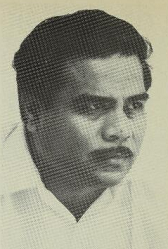Related Research Articles

The islands which now form the Republic of Kiribati have been inhabited for at least seven hundred years, and possibly much longer. The initial Austronesian peoples’ population, which remains the overwhelming majority today, was visited by Polynesian and Melanesian invaders before the first European sailors visited the islands in the 17th century. For much of the subsequent period, the main island chain, the Gilbert Islands, was ruled as part of the British Empire. The country gained its independence in 1979 and has since been known as Kiribati.

Politics of Kiribati takes place in a framework of a parliamentary representative democratic republic, whereby the Beretitenti, President of Kiribati, is both the head of state and head of government, and of a multi-party system. Executive power is exercised by the government, Beretitenti, and his cabinet, all MPs. Legislative power is exercised by the House of Assembly. The Judiciary of Kiribati is independent of the executive and the legislature. The Constitution of Kiribati, promulgated at independence on 12 July 1979, establishes the Republic of Kiribati as a sovereign democratic republic and guarantees the fundamental rights of its citizens and residents.

The Gilbert and Ellice Islands in the Pacific Ocean were part of the British Empire from 1892 to 1976. They were a protectorate from 1892 to 12 January 1916, and then a colony until 1 January 1976. The history of the colony was mainly characterized by phosphate mining on Ocean Island. In October 1975, these islands were divided by force of law into two separate colonies, and they became independent nations shortly thereafter: the Ellice Islands became Tuvalu in 1978, and the Gilbert Islands became part of Kiribati in 1979.

Ieremia Tienang Tabai is an I-Kiribati politician who served as the first Beretitenti President of the Republic of Kiribati, after being the youngest ever Chief minister of the Commonwealth of Nations and then becoming the youngest ever head of State. During his presidency, he was described as being the most able leader of the Pacific island states.
Sir Toaripi Lauti was a Tuvaluan politician who served as chief minister of the Colony of Tuvalu (1975–78), as the first prime minister following Tuvalu's independence (1978–1981) and governor-general of Tuvalu (1990–1993). He was married to Sualua Tui.

Teatao Teannaki was an I-Kiribati political figure who served as President of Kiribati from 1991 until 1994.
Sir Tomu Malaefone Sione was a political figure from the Pacific nation of Tuvalu. He worked as a journalist from 1962 to 1968, and held the post of radio announcer in the Broadcasting and Information Department of the administration of the Gilbert and Ellice Islands Colony (GEIC). He was the head of the southern Niutao clan. He was married to Segali.

The Parliament of Tuvalu is the unicameral national legislature of Tuvalu. The place at which the parliament sits is called the Vaiaku maneapa. The maneapa on each island is an open meeting place where the chiefs and elders deliberate and make decisions.

The House of Assembly is the Legislature of Kiribati. Since 2016, it has 45 members, 44 elected for a four-year term in 23 single-seat and multi-seat constituencies and 1 non-elected delegate from the Banaban community on Rabi Island in Fiji. From 1979 to 2016, the Attorney general was an ex officio member of the legislature, until a change of the constitution modified this provision.
A referendum on separating from the Gilbert Islands was held in the Ellice Islands between July and September 1974. A rolling ballot was used, starting in July in Tarawa in the Gilbert Islands before being taken to each resident of the Ellice Islands.
General elections were held in Tuvalu on 27 August 1977. As there were no political parties, all candidates ran as independents, with Toaripi Lauti remaining Chief Minister. Voter turnout was 78.8%.

General elections were held in the Solomon Islands between 22 May and 12 June 1973. The following year, Solomon Mamaloni of the People's Progressive Party became the first Chief Minister.
General elections were held in the Gilbert and Ellice Islands on 19 March 1971.
General elections were held in the Gilbert and Ellice Islands in 1967. All candidates ran as independents.
Henry Faati Naisali, CMG, AO, OBE was a Tuvaluan politician who served as Deputy Prime Minister of Tuvalu (1985-1989), Secretary General of the Pacific Islands Forum (1988-1992) and Pro-Chancellor of The University of the South Pacific (1985-1990). He is notable for co-founding the Tuvalu Trust Fund which lead Tuvalu to achieve greater financial autonomy.

Te Reuben Kiraua Uatioa was a Gilbertese politician. After being elected to the House of Representatives in 1967, he became the first Chief Elected Member of the Gilbert and Ellice Islands colony and then Leader of Government Business, serving until unexpectedly losing his seat in 1974. He then served as Speaker of the House of Representatives until 1975.
Sione Tui Kleiss was a Tuvaluan civil servant, priest and politician. He was a member of the legislature of the Gilbert and Ellice Islands from 1967 until the Ellice Islands separated in 1975, also serving as Minister for Commerce and Industry. Following the separation, he became a member of the Tuvalu House of Assembly and served as its Speaker.
Bwebwetake Areieta was an I-Kiribati politician. He served as a member of the Legislative Council and House of Assembly from 1971 until his death, also holding the posts of Member for Social Services and Minister of Communications, Works and Utilities during the 1970s.

Naboua T. Ratieta was an I-Kiribati politician who became the first Chief Minister of the Gilbert and Ellice Islands in 1974. The Ellice Islands separated from the colony the following year, and he remained Chief Minister of the Gilbert Islands until 1978. He also served as an MP from 1968 until his death.

Roniti Teiwaki is an I-Kiribati politician.
References
- 1 2 3 Decolonization United Nations, July 1979
- 1 2 3 Van Trease, Howard, ed. (1993). Atoll politics : the Republic of Kiribati. Christchurch, N.Z.: Macmillan Brown Centre for Pacific Studies, University of Canterbury and Institute of Pacific Studies, University of the South Pacific. pp. 8–9. ISBN 982-02-0081-4. OCLC 29414081.
- 1 2 Barrie Macdonald (2001) Cinderellas of the Empire: Towards a History of Kiribati and Tuvalu p242
- ↑ GEIC elections Pacific Islands Monthly, May 1974, p13
- ↑ The politics are new, not the economy Pacific Islands Monthly, July 1974, pp12–13
- ↑ Getting the bird Gilberts style Pacific Islands Monthly, July 1976, p18